#april 1924
Explore tagged Tumblr posts
Text

Fashion Illustration painted by John La Gatta (John LaGatta), The April Fashion Tour, Dresses from Harzfeld's, Selected by Isabel De Nyse Conover. Published in Woman's Home Companion, April 1924.
Isabel De Nyse Conover (American, 1891-1968) was a magazine editor and author.
#john la gatta#painting#illustration#1924#fashion illustration#john lagatta#april#april issue#april 1924#1924 illustrations#harzfeld's#isabel de nyse conover#woman's home companion#spring#spring fashion#day dresses#spring dresses#vintage illustration#vintage#antique#vintage fashion#the roaring twenties#jazz age#it-girls#1920s#20s#1920s fashion#20s fashion#1920s illustrations#20s illustrations
221 notes
·
View notes
Text

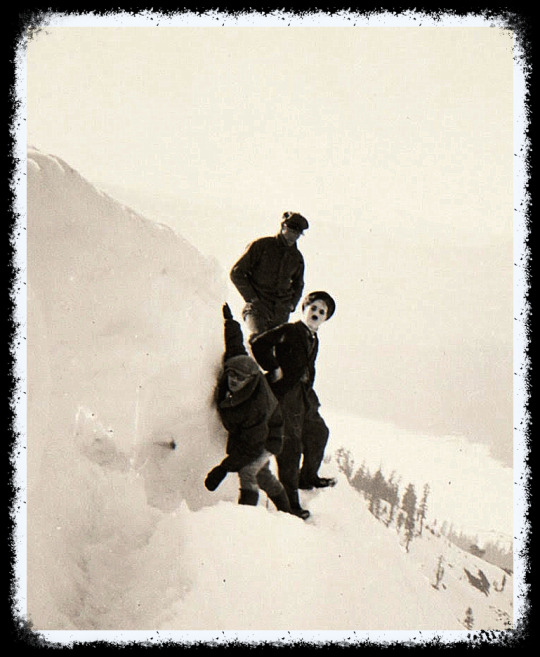
On location shooting “The Gold Rush”, Charlie Chaplin stands on the side of a mountain with his publicist Eddie Manson in front and I believe that is asst. director Eddie Sutherland behind him.
28 notes
·
View notes
Text


Letter to Senator Willis from the Woman's National Party of Ohio
Record Group 46: Records of the U.S. SenateSeries: Committee Papers of the Committee on the JudiciaryFile Unit: Petitions and Memorials, Resolutions of State Legislatures, and Related Documents, which were Referred to the Committee on the Judiciary from the 68th Congress
The Champion Chemical Co.
Manufacturers of
Champion Embalming Fluids
Steel Burial Vaults
Undertakers Sundries
Springfield, Ohio,
April 7th,
1924.
Senator Frank B. Willis,
Senate Office Bldg.,
Washington, D.C.
My dear Senator Willis: -
I am sure you will be interested to know that the attached resolutions were passed recently in Springfield.
Resolution No. 1 was passed unanimously by a body of men and women among whom were the presidents of the Rotary, Kiwanis, Lions, Optimists, Business and Professional Women's, and Woman's Federated Clubs.
Resolution No. 2 was passed on March 21st by the Civil Rights Protective League, membership four hundred and fifty, whose president is Mr. Charles L. Johnson.
Sincerely,
Margaret Baker [signature]
Chairman, Seventh Congressional District.
WOMAN'S NATIONAL PARTY.
MEB*MF
RESOLUTION #1
WHEREAS, it is the sense of this meeting that the Lucretia Mott Amendment, which reads " Men an women shall have equal rights throughout the United States and every place subject to its jurisdiction." should be passed at this session of Congress.
Therefore, BE IT RESOLVED 1st. That we ask our Senators and Representative in Congress from this State to vote and work in tis favor, and further
BE IT RESOLVED, that this Resolution be read into the Congressional Record.
RESOLUTION #2
WHEREAS, it is the desire of this audience that Congress pass the Lucretia Mott amendment, which provides that "men and women shall have equal rights throughout the United States and every place subject to its jurisdiction," and that this amendment be sent to the states for ratification as speedily as possible, therefore, be it resolved that:
Our senators and representative be requested to work and vote for the passage of this amendment, and see that this resolution shall be placed in the congressional record of the United States.
#archivesgov#April 7#1924#1920s#lucretia mott#ERA#equal rights amendment#equal rights#women's rights
16 notes
·
View notes
Text

Fritzi Ridgeway (BOTD 8th April 1898) - By Walter Fredrick Seely 1924
Credit To Forever Louise Brooks @ForeverLouiseB1 (Twitter)
#fritzi ridgeway#born 8th april 1898#by walter fredrick seely#1924#silent screen beauty#1920s#rare find#cropped photo#b/w photography
9 notes
·
View notes
Photo

Siamo tutti attori, le persone mentono per sopravvivere ogni giorno.
Marlon Brando
15 notes
·
View notes
Photo

2023 Daily drawing no.:098 Daily drawing no. to date.: 1,924 . . . . . . #day098of2023 #day1924 #1924 #april #april2023 #kraken #procreate #character #random #onedrawingadaychallenge #onedrawingaday #dailydrawing #drawing #illustration #russellolsonart https://www.instagram.com/p/Cqzl6RauHU2/?igshid=NGJjMDIxMWI=
#day098of2023#day1924#1924#april#april2023#kraken#procreate#character#random#onedrawingadaychallenge#onedrawingaday#dailydrawing#drawing#illustration#russellolsonart
0 notes
Text


April 9, 1924 Journals of Anais Nin 1923-1927 [volume 3]
#anais nin#literature#words#quotes#academia#april#april 9#dark academia#quote#lit#books#books and libraries#reading#quote of the day#bookworm#book quotes#prose#booklr#bibliophile#excerpt#light academia
828 notes
·
View notes
Text


Band of Brothers Birthdays
January
1 John S. Zielinski Jr. (b. 1925)
21 Richard D. “Dick” Winters (b. 1918)
26 Herbert M. Sobel (b. 1912)
30 Clifford Carwood "Lip" Lipton (b. 1920)
31 Warren H. “Skip” Muck (b. 1922) & Robert B. Brewer (b. 1924)
February
8 Clarence R. Hester (b. 1916)
18 Thomas A. Peacock (b. 1920)
23 Lester A. “Les” Hashey (b. 1925)
March
1 Charles E. “Chuck” Grant (b. 1922)
2 Colonel Robert L. “Bob” Strayer (b. 1910)
4 Wayne “Skinny” Sisk (b. 1922)
10 Frank J. Perconte (b. 1917)
13 Darrell C. “Shifty” Powers (b. 1923)
14 Joseph J. “Joe” Toye (b. 1919)
24 John D. “Cowboy” Halls (b. 1922)
26 George Lavenson (b. 1917) & George H. Smith Jr. (1922)
27 Gerald J. Loraine (b. 1913)
April
3 Colonel Robert F. “Bob” Sink (b. 1905) & Patrick S. “Patty” O’Keefe (b. 1926)
5 John T. “Johnny” Julian (b. 1924)
10 Renée B. E. Lemaire (b. 1914)
11 James W. Miller (b. 1924)
15 Walter S. “Smokey” Gordon Jr. (b. 1920)
20 Ronald C. “Sparky” Speirs (b. 1920)
23 Alton M. More (b. 1920)
27 Earl E. “One Lung” McClung (b. 1923) & Henry S. “Hank” Jones Jr. (b. 1924)
28 William J. “Wild Bill” Guarnere (b. 1923)
May
12 John W. “Johnny” Martin (b. 1922)
16 Edward J. “Babe” Heffron (b. 1923)
17 Joseph D. “Joe” Liebgott (b. 1915)
19 Norman S. Dike Jr. (b. 1918) & Cleveland O. Petty (b. 1924)
25 Albert L. "Al" Mampre (b. 1922)
June
2 David K. "Web" Webster (b. 1922)
6 Augusta M. Chiwy ("Anna") (b. 1921)
13 Edward D. Shames (b. 1922)
17 George Luz (b. 1921)
18 Roy W. Cobb (b. 1914)
23 Frederick T. “Moose” Heyliger (b. 1916)
25 Albert Blithe (b. 1923)
28 Donald B. "Hoob" Hoobler (b. 1922)
July
2 Gen. Anthony C. "Nuts" McAuliffe (b. 1898)
7 Francis J. “Frank” Mellet (b. 1920)
8 Thomas Meehan III (b. 1921)
9 John A. Janovec (b. 1925)
10 Robert E. “Popeye” Wynn (b. 1921)
16 William S. Evans (b. 1910)
20 James H. “Moe” Alley Jr. (b. 1922)
23 Burton P. “Pat” Christenson (b. 1922)
29 Eugene E. Jackson (b. 1922)
31 Donald G. "Don" Malarkey (b. 1921)
August
3 Edward J. “Ed” Tipper (b. 1921)
10 Allen E. Vest (b. 1924)
15 Kenneth J. Webb (b. 1920)
18 Jack E. Foley (b. 1922)
26 Floyd M. “Tab” Talbert (b. 1923) & General Maxwell D. Taylor (b. 1901)
29 Joseph A. Lesniewski (b. 1920)
31 Alex M. Penkala Jr. (b. 1924)
September
3 William H. Dukeman Jr. (b. 1921)
11 Harold D. Webb (b. 1925)
12 Major Oliver M. Horton (b. 1912)
27 Harry F. Welsh (b. 1918)
30 Lewis “Nix” Nixon III (b. 1918)
October
5 Joseph “Joe” Ramirez (b. 1921) & Ralph F. “Doc” Spina (b. 1919) & Terrence C. "Salty" Harris (b. 1920)
6 Leo D. Boyle (b. 1913)
10 William F. “Bill” Kiehn (b. 1921)
15 Antonio C. “Tony” Garcia (b. 1924)
17 Eugene G. "Doc" Roe (b. 1922)
21 Lt. Cl. David T. Dobie (b. 1912)
28 Herbert J. Suerth Jr. (b. 1924)
31 Robert "Bob" van Klinken (b. 1919)
November
11 Myron N. “Mike” Ranney (b. 1922)
20 Denver “Bull” Randleman (b. 1920)
December
12 John “Jack” McGrath (b. 1919)
31 Lynn D. “Buck” Compton (b. 1921)
Unknown Date
Joseph P. Domingus
Richard J. Hughes (b. 1925)
Maj. Louis Kent
Father John Mahoney
George C. Rice
SOURCES
Military History Fandom Wiki
Band of Brothers Fandom Wiki
Traces of War
Find a Grave
#this is going off who was on on the show#i double checked the dates and such but if you notice any mistakes please let me know :)#band of brothers#easy company#hbo war#not gonna tag everyone lol#mine: misc#yep it's actually Halls and not Hall#i've seen Terrence Harris's name spelled with as Terence but wenand t with two Rs s#since that's how it's spelled on photos of memorials and on his gravestone#I’ll do the pacific next! should be significantly shorter since there’s far fewer characters 😅
180 notes
·
View notes
Text
Easy Co. Oldest to Youngest
if there's anything incorrect or anyone missing please comment🤣 this is all I could find.
Roy Cobb: 18 June 1914
Joe Liebgott: 17 May 1915
Frank Perconte: 10 March 1917
Dick Winters: 21 January 1918
Harry Welsh: 27 September 1918
Lewis Nixon: 30 September 1918
Joe Toye: 14 March 1919
Ralph Spina: 5 October 1919
Robert van Klinken: 31 October 1919
Carwood Lipton: 30 January 1920
Thomas Peacock: 18 February 1920
Ron Speirs: 20 April 1920
Alton More: 22 April 1920
Bull Randleman: 20 November 1920
George Luz: 17 June 1921
Popeye Wynn: 10 July 1921
Don Malarkey: 31 July 1921
Ed Tipper: 3 August 1921
Joe Ramirez: 5 October 1921
Buck Compton: 31 December 1921
Skip Muck: 31 January 1922
Chuck Grant: 1 March 1922
Skinny Sisk: 4 March 1922
Johnny Martin: 12 May 1922
David Webster: 2 June 1922
Donald Hoobler: 28 June 1922
Moe Alley: 20 July 1922
Pat Christenson: 23 July 1922
Eugene Jackson: 29 July 1922
Jack Foley: 18 August 1922
Eugene Roe: 17 October 1922
Shifty Powers: 13 March 1923
Earl McClung: 27 April 1923
Bill Guarnere: 28 April 1923
Babe Heffron: 16 May 1923
Floyd Talbert: 26 August 1923
John Julian: 5 April 1924
James Miller: 11 April 1924
Alex Penkala: 31 August 1924
Tony Garcia: 15 October 1924
Lester Hashey: 23 February 1925
John Janovec: 9 July 1925
Patrick O’Keefe: 3 April 1926
#band of brothers#easy company#I am not going to tag them all#this was partially inspired by my need to see if Bill and Babe are indeed one of the youngest in the company.#sal rambles
108 notes
·
View notes
Text

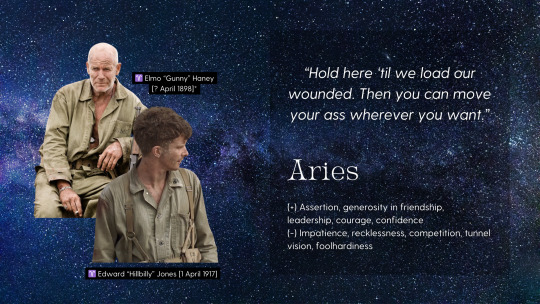







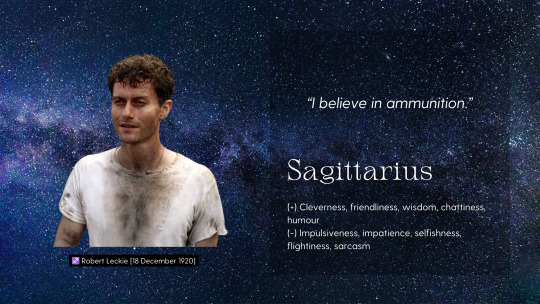
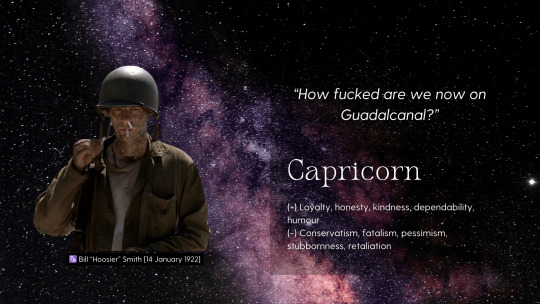
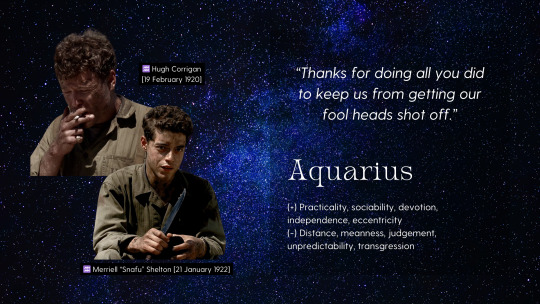


BOBSTROLOGY 2: THE PACIFIC BOOGALOO
Another completely serious presentation by @pegasusdrawnchariots and oatflatwhite
written version under the cut!
♈️ Edward “Hillbilly” Jones – 1 April 1917 ♈️ Elmo “Gunny” Haney – ?? April 1898 * ♉️ Clifford "Steve" Evanson – 25 April 1926 ♊️ Bill Leyden – 27 May 1926 ♊️ Robert Oswalt – 13 June 1923 ♊️ J. P. Morgan – 20 June 1919 * ♋️ Lewis “Chesty” Puller – 26 June 1898 ♌️ Chuck Tatum – 23 July 1926 * ♌️ Jay De L’Eau – 29 July 1923 ♌️ R. V. "Burgie" Burgin – 13 August 1922 ♌️ Manny Rodriguez – 17 August 1922 ♍️ Andrew “Ack Ack” Haldane – 22 August 1917 ♍️ Sidney Phillips – 2 September 1924 ♎️ Vera Keller – 13 October 1923 ♎️ Lew “Chuckler” Juergens – 22 October 1918 ♏️ John Basilone – 4 November 1916 ♏️ Eugene Sledge – 4 November 1923 ♏️ Wilbur “Runner” Conley – 6 November 1921 ♐️ Robert Leckie – 18 December 1920 ♑️ Bill “Hoosier” Smith – 14 January 1922 ♒️ Merriel “Snafu” Shelton – 21 January 1922 ♒️ Hugh Corrigan – 19 February 1920 ���️ Lena Riggi Basilone – 7 March 1913
2 Aries 1 Taurus 3 Gemini 🥈 1 Cancer 4 Leo 🥇 2 Virgo 2 Libra 3 Scorpio 🥈 1 Sagittarius 1 Capricorn 2 Aquarius 1 Pisces
7 🔥 4 🪨 7 💨 5 💧
6 cardinal 10 fixed 7 mutable
14 masculine 9 feminine
* Gunny Haney's day of birth is not known; we went with Aries on vibes * J. P. Morgan's birthday was taken from The Pacific wiki but we couldn't verify it elsewhere (or whether he was actually a real dude?) * Chuck Tatum is a cusp and we assigned him Leo based on his city of birth if he had been born at noon; also on vibes
** Other characters in The Pacific are based on people from Leckie and Sledge's memoirs, but their names are either changed or they are only referred to by surname and quite unidentifiable, based on my (oatflatwhite's) original search (which was not exhaustive!). Ronnie Gibson and Stella Karamanlis, for example, seem to be based off of real people Leckie encountered during the war, but were not their actual names. Others, like minor officers in both K and H companies, and the doctors Leckie sees, I just couldn't track down. We could locate the birthdays of Sledge's family (brother and parents) but since we couldn't do the same for Leckie and Basilone, we left them off this list. They're two more Scorpios and another Virgo, by the way.
*** And if you've read this far, @pegasusdrawnchariots assigned Stella Leo based on vibes :-)
#the pacific#hbo war#thepacificedit#hbowaredit#bobstrology#liz makes things#robert leckie#eugene sledge#john basilone#et cetera et cetera#phew what an undertaking
89 notes
·
View notes
Text

This is Gerda Weissmann Klein.
She spent three years in several different Nazi concentration camps. In late January of 1945, Gerda and 4,000 other Jewish women were forced to embark on a 350-mile death march to flee the advances of the Allied forces.
By early May, Gerda was one of only 120 women who were still alive. The rest—including several of her childhood friends—had died from exhaustion, starvation, random executions, and exposure to the elements.
Gerda was one day shy of her 21st birthday when she was rescued by American soldiers. Weighing only 68 lbs. (30.84 kg), Gerda’s hair was nearly white and her clothes were tattered and crawling with lice. She hadn’t taken a bath in three years.
She later recalled seeing the man who saved her life:
“I stood in the doorway of that factory, and I knew that I was free. I saw a strange car coming down the hill, with the white star of the American army on its hood. Two men in strange uniforms sat in it, we gathered them to be Americans. One of the men came towards me, and I looked at him with incredible awe and disbelief that I was looking at someone who fought for us. Of course I was terribly frightened. I looked at him and said, ‘we are Jewish.’ There was a long paused, then he said, ‘so am I.’ It was the greatest moment of my life. He asked me to come with him, and he held the door open for me. He has now been holding the door open for 50 years as my husband.”
Gerda married Kurt Klein in Paris and moved to Buffalo, New York where they eventually had three children and eight grandchildren.
Gerda became a human rights activist and published her own autobiography titled, "All But My Life."

May 8, 1924 – April 3, 2022
historycoolkids
138 notes
·
View notes
Text
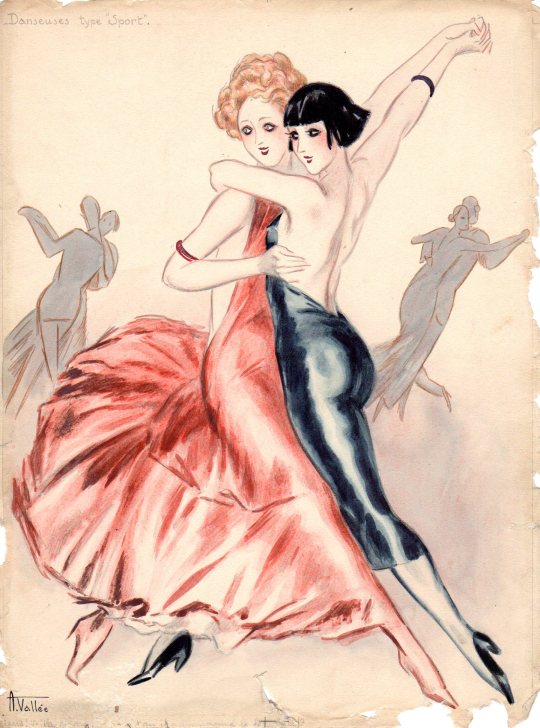
Armand Vallée (1884-1960), Danseuses Type Sport, A Quoi Pensent Les Jeunes Filles (What Do Young Girls Think), La Vie Parisienne, 19. April, 1924.
#Armand Vallée#Armand Vallee#illustration#1924#lesbians#lesbian art#la vie parisienne#april issue#art deco#1924 illustrations#sport#sporty#sporty girls#the back#tango#dancing#dancing tango#sports dance#lbtqia#A. Vallee#1920s#costume design#magazine#fashion illustration#20s lifestyle#parisian chic#chic#it-girls#art
292 notes
·
View notes
Text

On April 3rd, 1924, 23 year old Beulah Annan shot her lover, Harry Kalstedt, after an argument in her Chicago apartment, then made a cocktail and played a record on repeat for hours, watching him die.
Over the course of her murder trial, Beulah claimed at various times that she had shot Harry to prevent him raping her, that she had shot him because he became violent when she told him she was pregnant, and that she had narrowly grabbed the loaded gun first as they both lunged for it. Throughout all of this, Beulah's husband nearly bankrupted himself attempting to help her, convinced of her innocence. The day after she was acquitted she told the press that she was getting a divorce because he was "too slow." The baby never materialized.
Also in jail at this time was another murder suspect named Belva Gaertner, who had also shot her lover and claimed to have no memory of the incident because she was drunk when it happened. The two became the poster children for the supposed dangers of nascent jazz culture. Maureen Watkins, a reporter at both of the trials, later wrote both characters into a play called Chicago, which was eventually made into the musical we all know and love.
#history#1920s#chicago#theater#better late than never#hundredth anniversary of the day roxie and velma met in jail
286 notes
·
View notes
Text

Letter from the President of Roosevelt Worsted Mills to Representative George S. Graham against the Child Labor Amendment
Record Group 233: Records of the U.S. House of RepresentativesSeries: Bill Files of the Committee on the JudiciaryFile Unit: Papers Accompanying Specific Bills and Resolutions of the Committee on the Judiciary from the 68th Congress
[[Letterhead]]
ROOSEVELT WORSTED MILLS
WORSTED YARN SPINNERS
WEAVING YARNS 2016 NAUDAIN STREET KNITTING YARNS
PHILADELPHIA, [[end of letterhead]] April 8, 1924
[[handwritten in blue]] H Res 184
Hon. George S. Graham,
House of Representatives,
Washington, D.C.
Dear Sir:
We wish to express to you our heartiest congratulation and deep appreciation of your courage and statesmanship as revealed in your report in opposition to the proposed Child Labor Amendment to the Constitution.
We hope that this report will be accorded wide publicity and that it will help to stop the vicious tendency, lately developed, in trying to cure every evil by a proposed amendment to the Constitution of the United States.
Yours very truly,
ROOSEVELT WORSTED MILLS.
[[signed]] Fritz Quittner.
President
FQ/L
19 notes
·
View notes
Text

Henry Mancini (April 16, 1924 – June 14, 1994) 🎶
173 notes
·
View notes
Text




Radio Rex (1922), Elmwood Button Co., Stratford, Conn. "Radio Rex was the first commercial toy to respond to voice commands. Produced in 1922 by the Elmwood Button Co., Radio Rex predates computers by more than 20 years. Rex is a brown bulldog made of celluloid and metal that responds to its name by leaping out of its house. The dog is controlled by a spring that is held in check by an electromagnet. The electromagnet is sensitive to sound patterns containing acoustic energy around 500 Hz, such as the vowel in "Rex." The acoustic trigger interrupts the current to the electromagnet allowing the spring to propel Rex out of its house." – Toys That Have a Voice, by Judith Markowitz, SpeechTechMag.
"The little toy called "Radio Rex" is familiar to everybody. The toy dog that comes out of his little kennel when you speak to him does not really work by radio, but he does exemplify a prophecy of radio. Anyone who feels like it can build into his house, tomorrow, a radio device, for example, that will open a door if you speak to it. Set this device for the words "open sesame" and you can emulate the master of the forty thieves." – Will Radio Do Our Housework?, Popular Radio, April 1924 (p.358).
67 notes
·
View notes